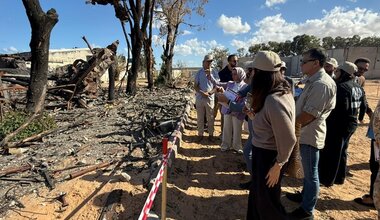Libyan Economic Dialogue Meets to Follow up on Critical Economic Reforms
6 January 2021 – On 5 January, Acting Special Representative of the Secretary-General (ASRSG) and Head of the United Nations Support Mission in Libya Stephanie Williams, together with the co-chairs of the Economic Working Group (EWG), including the Ambassadors of the Republic of Egypt, the European Union, and the United States, convened a virtual meeting of Libyan policy makers to follow up on the basket of reforms discussed in Geneva on 14-15 December 2020. The meeting brought together GNA Minister of Finance Faraj Bumtari, IG Deputy Minister of Finance Morajea Ghaith, National Oil Corporation (NOC) Chairman Mustafa Sanallah, GNA Acting Minister of Planning Mohamed Zaidani, as well as representatives of the two branches of the Central Bank of Libya (CBL) and the National Audit Bureau. Libyan economic experts from the Libyan Economic Dialogue as well as representatives of the World Bank and IMF also participated in the meeting.
The EWG co-chairs welcomed the increased collaboration and exchanges among Libyan economic and financial institutions. This includes increased communication between the Ministries of Finance and the two branches of the CBL, as well as the intention of the principals to meet physically to consolidate collaboration. The resumption of meetings of the CBL Board of Directors, which first met on 16 December 2020 after six years of inactivity, was also warmly welcomed. EWG members encouraged all parties to continue to build on these examples of cooperation in the national interest.
This renewed cooperation is enabling Libyan institutions to implement long overdue economic reforms. The decision of the CBL Board of Directors to unify the exchange rate, which was implemented on 3 January, will strengthen the dinar, lower commodity prices and reduce the space for money laundering and corruption, as well as ensure that all economic actors have access to the same exchange rate. UNSMIL also welcomed the prospective decision of the Central Bank of Libya to address the banking crisis by reducing the cheque clearing backlog. This crisis has increasingly threatened the integrity of the Libyan banking system and contributed to the liquidity crisis.
The Ministry of Finance reported that progress was being made towards the harmonisation of monetary policy, which needed to be accompanied by fiscal policy reform, including the unification and rationalisation of the national budget for 2021. A meeting will be held soon to agree on a consolidated budget. Participants agreed that funds need to be effectively allocated to development spending including to local governance, the National Oil Corporation and basic services, specifically the electricity sector which was suffering from years of neglect.
Agreement on a consolidated and unified budget is the major outstanding step in the set of reforms needed to create a more durable, equitable and accountable economic arrangement in Libya which will determine an improvement in financial governance and management of oil revenues. UNSMIL and the EWG Co-Chairs reiterated their commitment to continue supporting the Libyan Economic Dialogue to reinforce Libyan progress in consolidating the budget and improve the transparent management of oil revenues.
 United Nations Peacekeeping
United Nations Peacekeeping UN
UN









